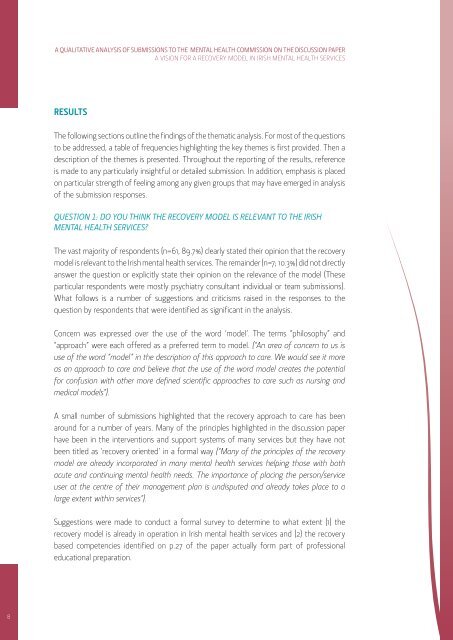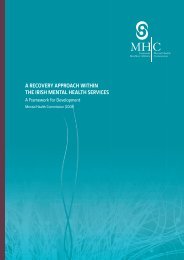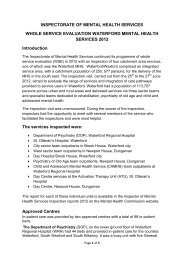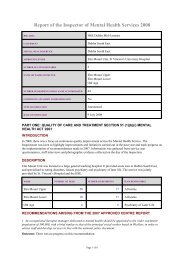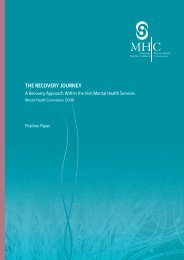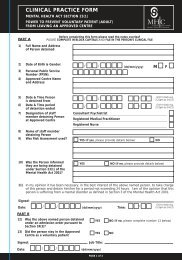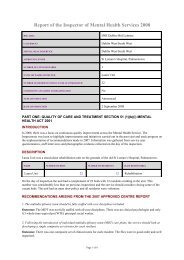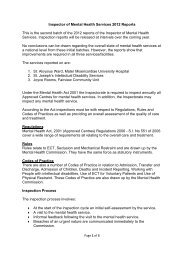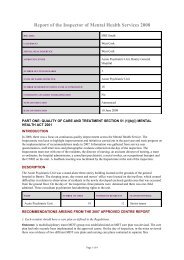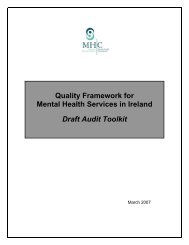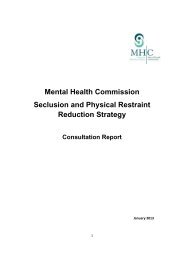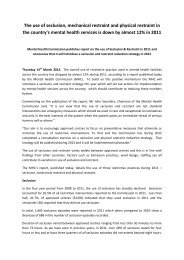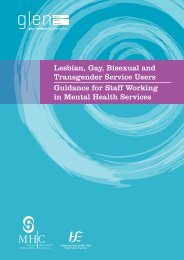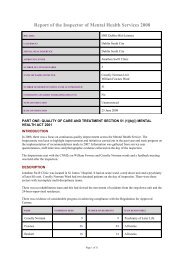a vision for a recovery model in irish mental health services
a vision for a recovery model in irish mental health services
a vision for a recovery model in irish mental health services
You also want an ePaper? Increase the reach of your titles
YUMPU automatically turns print PDFs into web optimized ePapers that Google loves.
A Qualitative Analysis of Submissions to the Mental Health Commission on the Discussion PaperA Vision <strong>for</strong> a Recovery Model <strong>in</strong> Irish Mental Health ServicesResultsThe follow<strong>in</strong>g sections outl<strong>in</strong>e the f<strong>in</strong>d<strong>in</strong>gs of the thematic analysis. For most of the questionsto be addressed, a table of frequencies highlight<strong>in</strong>g the key themes is first provided. Then adescription of the themes is presented. Throughout the report<strong>in</strong>g of the results, referenceis made to any particularly <strong>in</strong>sightful or detailed submission. In addition, emphasis is placedon particular strength of feel<strong>in</strong>g among any given groups that may have emerged <strong>in</strong> analysisof the submission responses.Question 1: Do you th<strong>in</strong>k the <strong>recovery</strong> <strong>model</strong> is relevant to the Irish<strong>mental</strong> <strong>health</strong> <strong>services</strong>?The vast majority of respondents (n=61, 89.7%) clearly stated their op<strong>in</strong>ion that the <strong>recovery</strong><strong>model</strong> is relevant to the Irish <strong>mental</strong> <strong>health</strong> <strong>services</strong>. The rema<strong>in</strong>der (n=7; 10.3%) did not directlyanswer the question or explicitly state their op<strong>in</strong>ion on the relevance of the <strong>model</strong> (Theseparticular respondents were mostly psychiatry consultant <strong>in</strong>dividual or team submissions).What follows is a number of suggestions and criticisms raised <strong>in</strong> the responses to thequestion by respondents that were identified as significant <strong>in</strong> the analysis.Concern was expressed over the use of the word ‘<strong>model</strong>’. The terms “philosophy” and“approach” were each offered as a preferred term to <strong>model</strong>. (“An area of concern to us isuse of the word “<strong>model</strong>” <strong>in</strong> the description of this approach to care. We would see it moreas an approach to care and believe that the use of the word <strong>model</strong> creates the potential<strong>for</strong> confusion with other more def<strong>in</strong>ed scientific approaches to care such as nurs<strong>in</strong>g andmedical <strong>model</strong>s”).A small number of submissions highlighted that the <strong>recovery</strong> approach to care has beenaround <strong>for</strong> a number of years. Many of the pr<strong>in</strong>ciples highlighted <strong>in</strong> the discussion paperhave been <strong>in</strong> the <strong>in</strong>terventions and support systems of many <strong>services</strong> but they have notbeen titled as ‘<strong>recovery</strong> oriented’ <strong>in</strong> a <strong>for</strong>mal way (“Many of the pr<strong>in</strong>ciples of the <strong>recovery</strong><strong>model</strong> are already <strong>in</strong>corporated <strong>in</strong> many <strong>mental</strong> <strong>health</strong> <strong>services</strong> help<strong>in</strong>g those with bothacute and cont<strong>in</strong>u<strong>in</strong>g <strong>mental</strong> <strong>health</strong> needs. The importance of plac<strong>in</strong>g the person/serviceuser at the centre of their management plan is undisputed and already takes place to alarge extent with<strong>in</strong> <strong>services</strong>”).Suggestions were made to conduct a <strong>for</strong>mal survey to determ<strong>in</strong>e to what extent (1) the<strong>recovery</strong> <strong>model</strong> is already <strong>in</strong> operation <strong>in</strong> Irish <strong>mental</strong> <strong>health</strong> <strong>services</strong> and (2) the <strong>recovery</strong>based competencies identified on p.27 of the paper actually <strong>for</strong>m part of professionaleducational preparation.8


